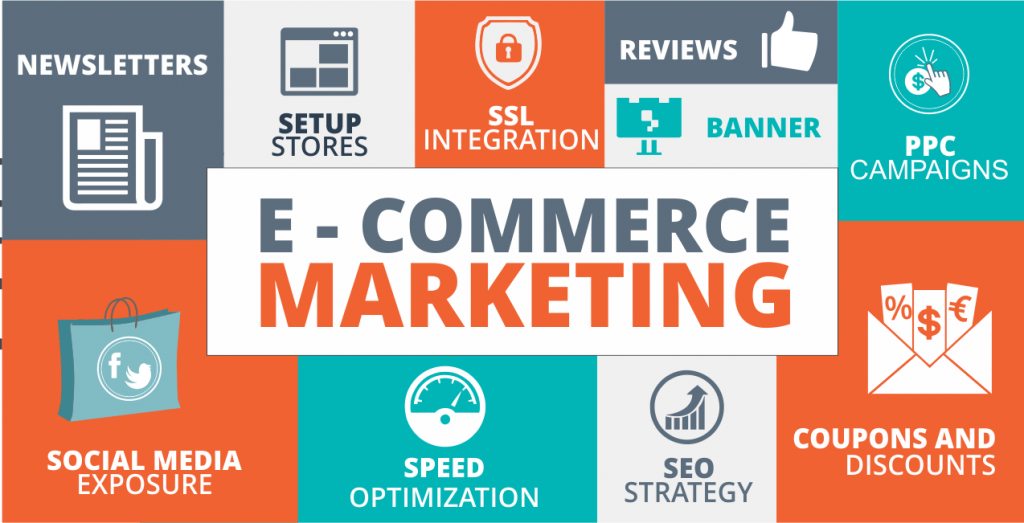What is Ecommerce Marketing ?
Ecommerce marketing is the practice of promoting and selling products or services online through digital channels. It combines multiple marketing techniques such as SEO, paid advertising, content marketing, social media, and email campaigns to drive traffic and boost sales for online stores.
In short, e-commerce marketing is about reaching potential customers, convincing them to make a purchase, and encouraging repeat sales.

Why is Ecommerce Marketing Important?
-
Increases Visibility – Millions of online stores exist; marketing ensures your brand stands out.
-
Drives Targeted Traffic – Reaches customers who are already interested in your products.
-
Boosts Conversions – Marketing strategies guide users from interest to purchase.
-
Encourages Customer Loyalty – Repeat campaigns and personalized offers keep customers coming back.
-
Competes with Big Brands – With smart marketing, even small businesses can challenge giants like Amazon.
Key Ecommerce Marketing Strategies
Search Engine Optimization (SEO)
Optimize your product pages, meta descriptions, and blog content to rank higher on Google. Example: If you sell shoes, target keywords like “buy running shoes online.”Pay-Per-Click Advertising (PPC)
Run targeted Google Ads or Facebook Ads to drive instant traffic to your store. Paid ads are especially useful during festive seasons or product launches.Content Marketing
Blogs, videos, and product guides help customers make informed choices. Example: “How to Choose the Right Laptop for Students.”Social Media Marketing
Platforms like Instagram, Facebook, and TikTok are perfect for showcasing products visually. Use reels, stories, and influencer collaborations.Email Marketing
Send personalized emails about discounts, new arrivals, or abandoned carts. Email campaigns are proven to boost repeat purchases.Affiliate Marketing
Partner with bloggers, YouTubers, and influencers who promote your products in exchange for a commission.Remarketing Campaigns
Use cookies to retarget visitors who viewed your products but didn’t buy. Retargeting ads often convert better.
Tools for Ecommerce Marketing
Shopify Marketing Tools – Built-in SEO and analytics.
Google Analytics – Track user behavior and sales performance.
Klaviyo / Mailchimp – Powerful email marketing automation.
SEMrush / Ahrefs – SEO and keyword analysis tools.
Hootsuite / Buffer – Social media management.
Best Practices for Ecommerce Marketing
Use high-quality product images and videos.
Offer discounts, coupons, and bundle deals to attract buyers.
Provide fast shipping and easy return policies.
Optimize your store for mobile devices, as most users shop on phones.
Collect and display customer reviews to build trust.
Track analytics regularly and adjust campaigns.
Career in Ecommerce Marketing
As e-commerce continues to grow, so does the demand for professionals skilled in online marketing. Career opportunities include:
Ecommerce Marketing Specialist
SEO Manager
Paid Ads Expert
Email Marketing Strategist
Social Media Manager
Freelancers and entrepreneurs can also build their own online stores and scale them using e-commerce marketing techniques.
Conclusion
Ecommerce marketing is the backbone of online business success. With millions of people shopping online every day, businesses must leverage SEO, paid ads, content creation, and social media to drive traffic and boost conversions.
Whether you are just starting your online store or looking to scale an existing one, the right e-commerce marketing strategies will help you increase visibility, build customer trust, and grow revenue.
